Key takeaways:
- Subject matter experts (SMEs) can simplify complex concepts, fostering better understanding and collaboration.
- Open communication and mutual respect are essential for effective collaboration with experts.
- Technology tools, like cloud-based management and video conferencing, enhance collaboration and engagement.
- Experiences with experts highlight the importance of humility, curiosity, and the value of sharing both successes and failures in education.
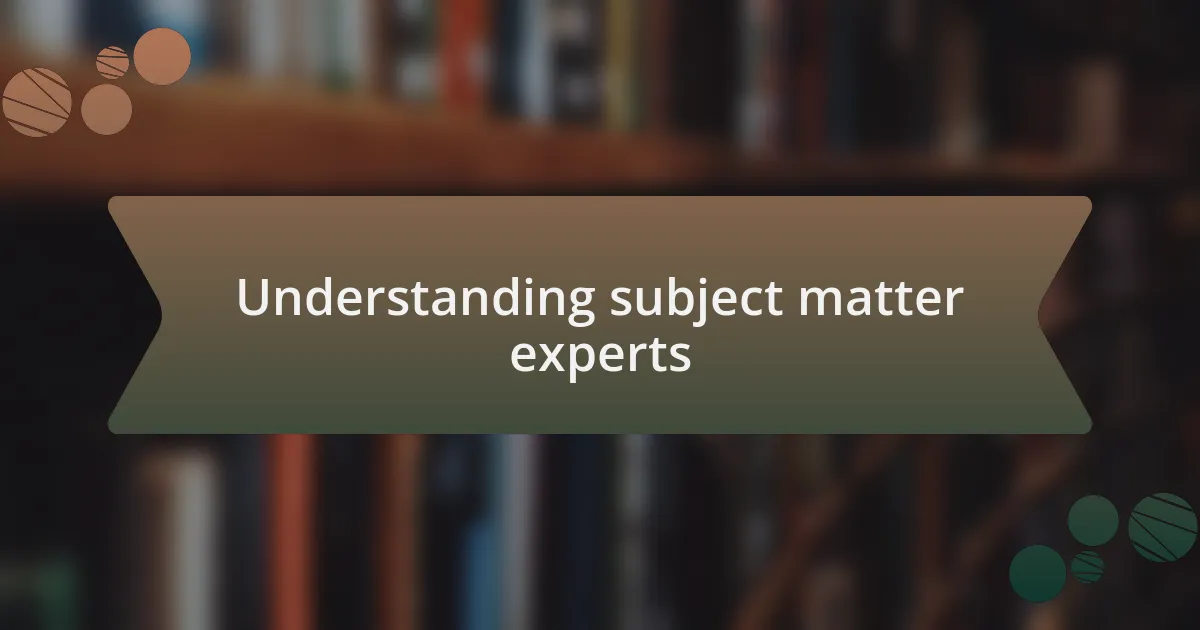
Understanding subject matter experts
Subject matter experts (SMEs) are individuals with deep knowledge and skills in specific areas, often acquired through extensive experience and education. I remember my first encounter with an SME during a project on educational software development. I was on edge, wondering how I could effectively communicate with someone whose expertise seemed light-years ahead of mine. However, I soon realized that their passion for the subject made them approachable and eager to share their insights.
The beauty of collaborating with SMEs lies in their ability to break down complex concepts into digestible pieces. There was a moment when an SME explained a complicated educational theory to me using a simple analogy about gardening. I found myself picturing the process of nurturing plants, which made the theory so much clearer. This experience underscored for me how vital it is to tap into their knowledge; even a nuanced topic can come to life when an SME guides you through it.
To fully harness the potential of an SME, it’s essential to foster open communication. Have you ever felt intimidated by someone’s expertise? I know I have, and it can create barriers. But trust me; when you invite SMEs to share their thoughts freely, you not only gain valuable insights but also transform the collaboration into a two-way street where learning and growth happen for both parties.
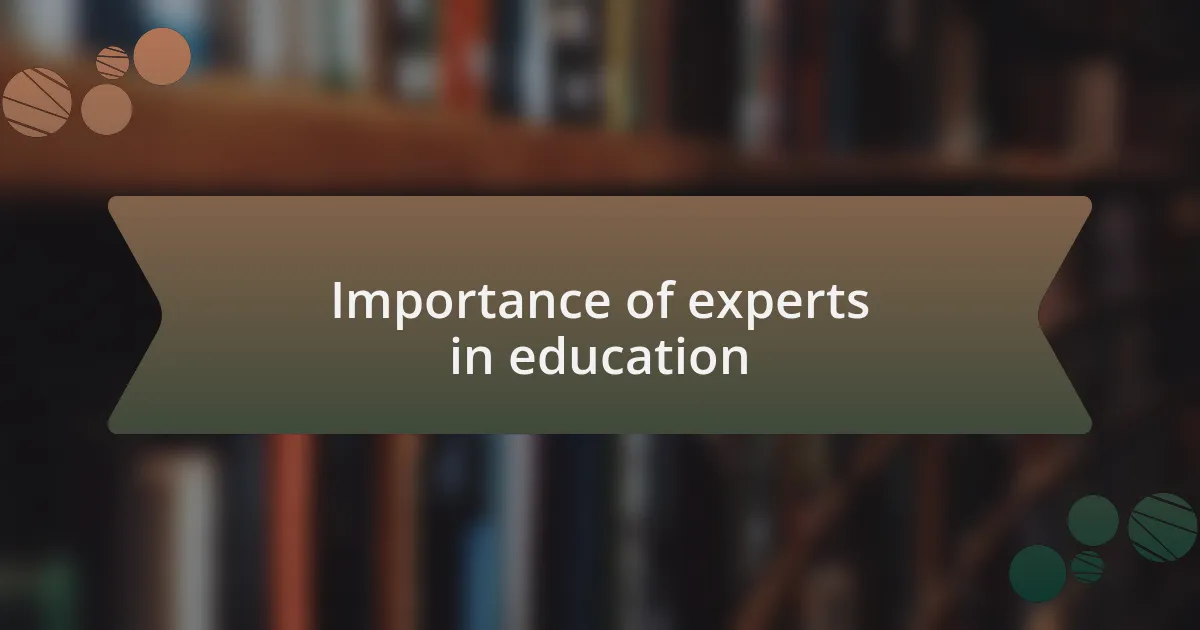
Importance of experts in education
The role of experts in education cannot be overstated. When I worked on developing a curriculum, an educational psychologist provided insights that completely shifted my perspective. It was as if a light bulb went off, illuminating the connection between learning theories and practical application. Without that expert’s guidance, I would have likely missed the vital nuances that enhance student engagement.
Moreover, I’ve often found that SMEs bring a wealth of real-world examples to the table. During a brainstorming session with a seasoned teacher, I saw the power of storytelling in education. She shared a personal experience that exemplified how certain strategies can create transformative learning moments. This taught me that an expert’s experiences can form the bridge between theory and practice, making it relatable and actionable for us all.
In my experience, the collaboration with experts often leads to unexpected revelations. Have you ever had a conversation that turned your understanding upside down? I remember discussing assessment strategies with a data analyst who revealed how subtle changes in approach could drastically improve student outcomes. These kinds of insights are what make working with SMEs not only enlightening but also essential for developing effective educational resources.
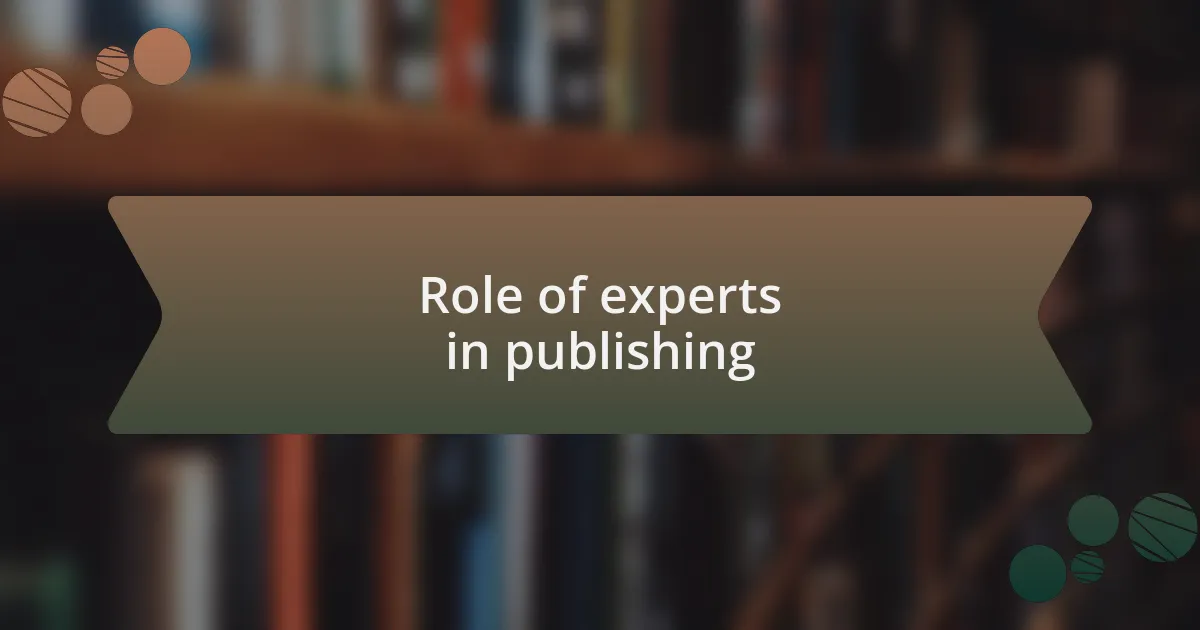
Role of experts in publishing
The role of experts in publishing is crucial, often acting as the backbone of credible and reliable content. I distinctly remember working alongside a subject matter expert who specialized in educational technology. Their detailed knowledge provided clarity on recent trends that shaped our publication and ensured that we were not only up-to-date but also relevant to our audience. Can you imagine publishing without that level of insight?
Experts not only inform the content but also enhance its quality by bringing rigor to the editorial process. I recall a particularly intense review session where an SME meticulously went through our draft, pointing out not just errors, but also suggesting deeper explorations of certain concepts. It felt like getting a VIP backstage pass to a concert; I could see the art and effort that so often remain hidden from the public eye. That experience taught me the importance of having experts refine our language and make complex ideas accessible.
Lastly, collaboration with experts often sparks innovation. I vividly remember brainstorming with a renowned researcher about developing interactive learning materials. Their insistence on user engagement led us to implement features we initially overlooked. It was a game-changer! I believe that when experts contribute their perspectives, they don’t just uplift the material; they challenge us to rethink our approach and broaden our horizons. Wouldn’t you agree that fresh insights can be a catalyst for great change in educational publishing?
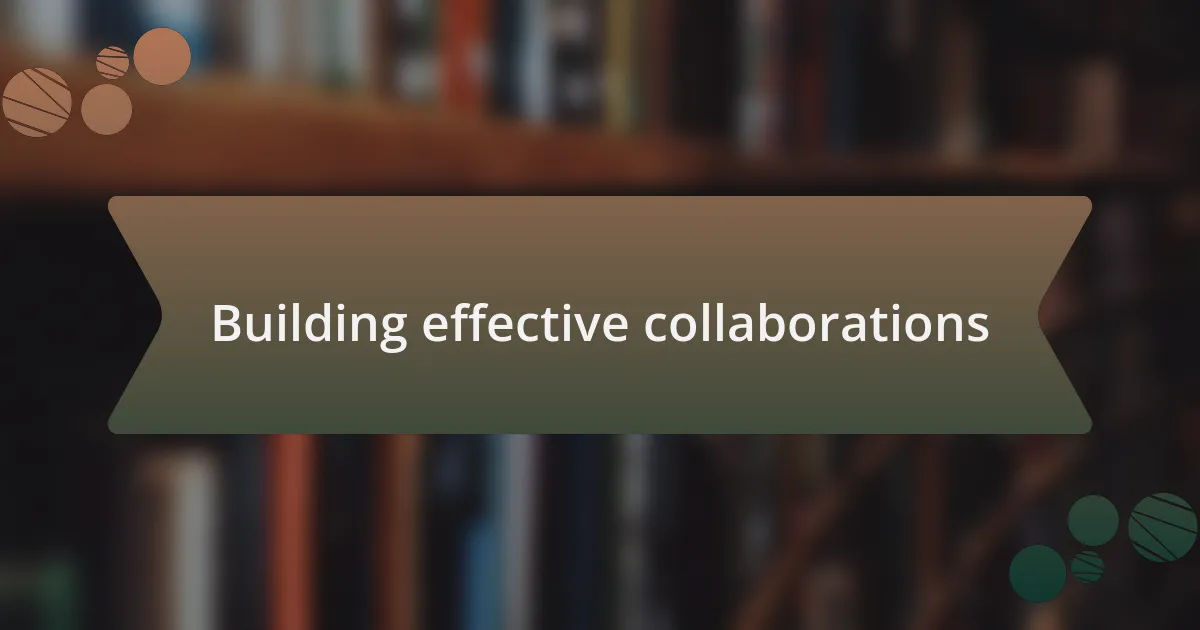
Building effective collaborations
Building effective collaborations requires clear communication and mutual respect. I vividly remember a project where an expert in curriculum design and I had different views on the target audience’s needs. After some frank discussions, we not only aligned our perspectives but also uncovered shared goals that enhanced our content. Isn’t it amazing how a little understanding can lead to breakthroughs?
Trust is the foundation of a successful collaboration. In a recent partnership with a subject matter expert focused on early childhood education, I was initially nervous about sharing my ideas. However, their openness and encouragement helped me feel valued, making it easier to share my voice. This experience reinforced my belief that when both parties are comfortable, creativity flourishes.
Lastly, flexibility is key to navigating the challenges that arise. I recall a situation where an SME’s last-minute requests led to significant shifts in our project timeline. Instead of viewing it as a setback, I embraced the change, leading our team to develop a more innovative approach to the material. How many times have we learned that adaptability can turn potential obstacles into exciting opportunities?
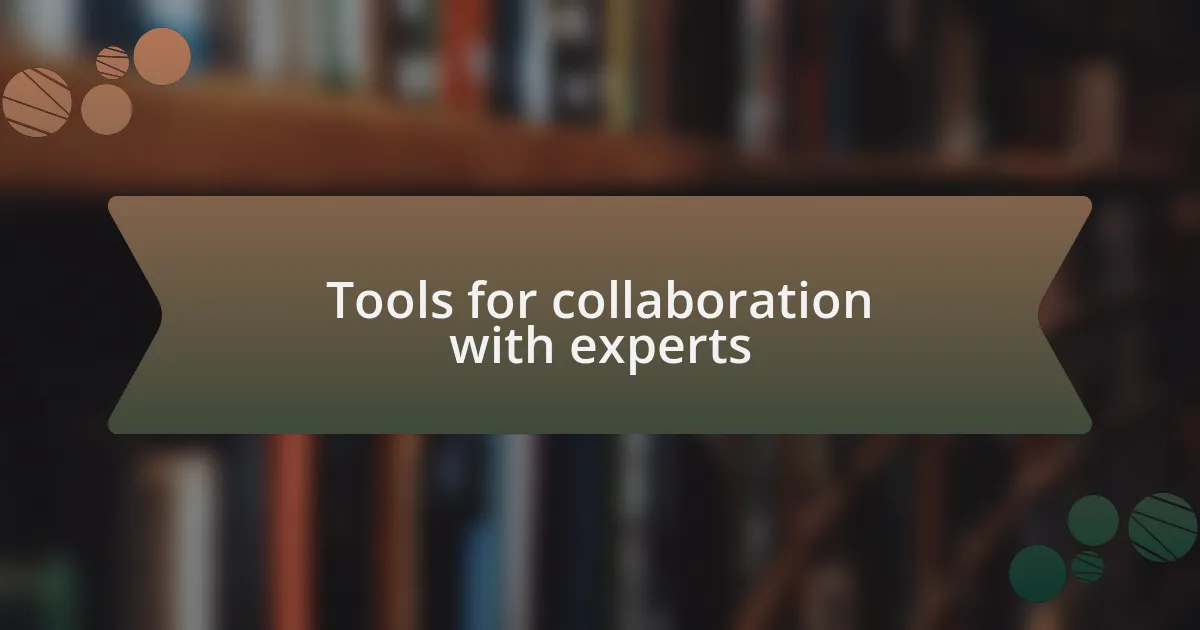
Tools for collaboration with experts
When collaborating with subject matter experts, utilizing the right tools can truly enhance the process. For example, I once used a cloud-based project management tool that allowed us to track progress and share files seamlessly. The ease of access made it simple to exchange ideas in real-time, fostering a collaborative atmosphere. Have you ever noticed how technology can create a space for more open dialogue?
Another tool I found invaluable was video conferencing software. During a particularly complex session with an expert in adaptive learning, being able to see facial expressions and body language transformed our interaction. It made our discussions far richer than through emails alone. That’s where I realized, in-person communication, even virtually, can bridge gaps much quicker than written words.
Moreover, I’ve also discovered the merits of collaborative document editing platforms. They allowed both parties to contribute ideas simultaneously, which felt like a dynamic dialogue rather than a one-sided interaction. It reminded me of a brainstorming session where every thought was valued, leading us to insights that neither of us had anticipated. Isn’t it fascinating how these tools can elevate the level of collaboration?
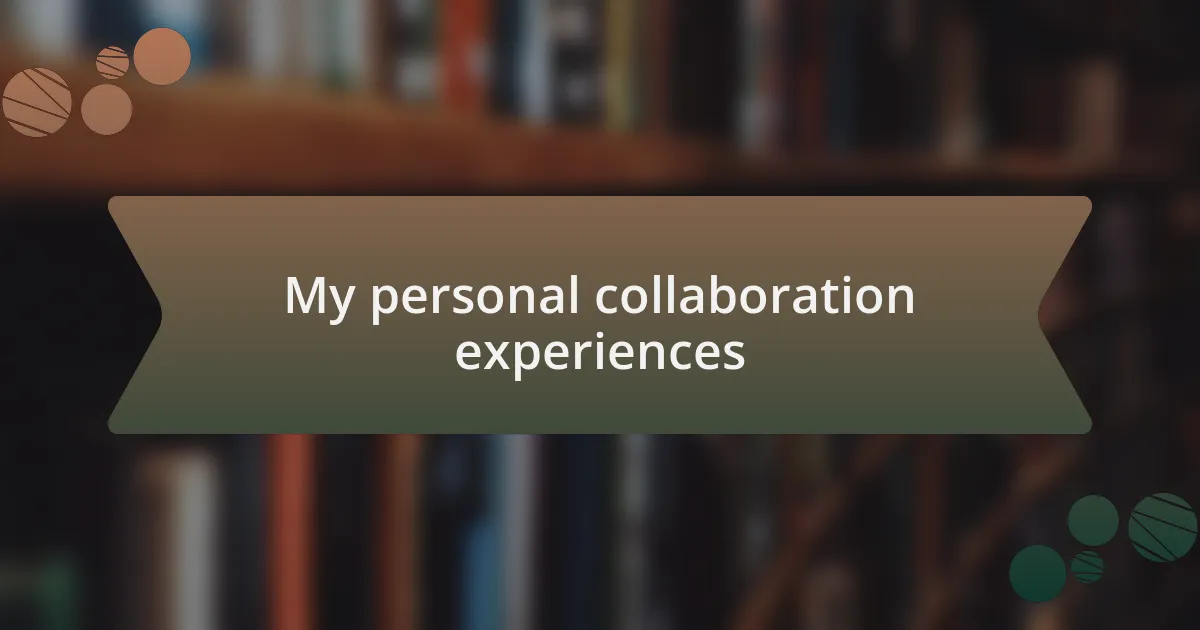
My personal collaboration experiences
When I reflect on my collaboration experiences with subject matter experts, I remember a project involving a renowned educational psychologist. At first, I was intimidated by their expertise, but as we dove into brainstorming sessions, I realized how open they were to my ideas. That initial nervousness quickly transformed into a genuine partnership—I had never felt so validated in my contributions.
During another initiative, I collaborated with a science educator who had a knack for storytelling. It was eye-opening to see how their passion for the subject sparked creative discussions. Together, we crafted educational content that was not just informative but also engaging. I often wonder, how much more impactful could our lessons be when infused with personal stories?
There was also a time when I faced pushback from an expert who had strong opinions on certain methodologies. What struck me was the respect in our exchanges; we both came away with a deeper understanding of our contrasting views. I learned that sometimes, challenging conversations can lead to the most rewarding outcomes—how often do we shy away from discussions that push our limits?
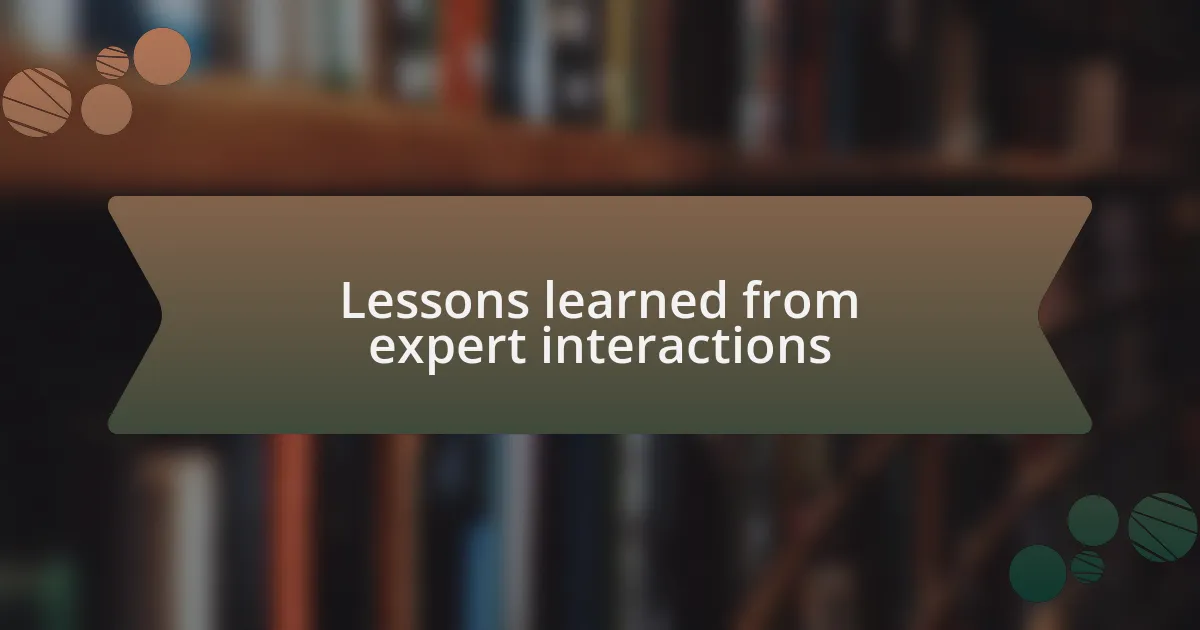
Lessons learned from expert interactions
Engaging with subject matter experts has taught me the value of humility and curiosity. I recall a specific instance where I was working on a curriculum design project. The historian I collaborated with not only shared vast knowledge but also encouraged me to ask questions, no matter how basic they seemed. This experience underscored an important lesson: in education, the willingness to learn and to engage openly is essential for growth.
There was another moment during a workshop when an expert shared a personal failure in their educational approach. It was surprisingly refreshing; their vulnerability sparked a discussion on resilience and adaptability in teaching. It made me think—how often do we share our failures as learning opportunities? This open dialogue reinforced the idea that sharing our missteps can foster a culture of innovation and growth.
In contrast, I’ve encountered experts who were rigid in their viewpoints. One memorable discussion with a mathematics curriculum developer left me feeling frustrated at first. However, the necessity of defending my ideas forced me to articulate my thoughts more clearly. Ultimately, it dawned on me that respectful disagreements can lead not only to better understanding but also to stronger ideas. Isn’t it fascinating how conflict, when approached constructively, can become the source of synergy?